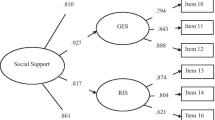Abstract
Recent research suggests that social support is associated with recovery from chronic diseases, greater life satisfaction, and enhanced ability to cope with life stressors. To further research in the area of social support and serious psychiatric disabilities, more reliable and valid measures are needed to assess this construct. The purpose of this study was to assess the psychometric properties of a widely used measure of social support (the Interpersonal Support Evaluation Checklist) among people with severe mental illness. We collected data on the ISEL's relationship to quality of life, self-esteem, psychiatric symptoms and vocational status among 147 participants. Factor and reliability analyses, as well as correlational analyses were undertaken. We found evidence for the reliability and validity of the ISEL when used with persons with severe mental illness. Taken together, our findings suggested that self-esteem, quality of life, and psychiatric symptoms were able to predict 38% of the variance in perceived social support. More favorable social supports increased the odds of being employed at 9months into the study and social support was predictive of experiencing fewer psychiatric symptoms. Some forms of social support were perceived less favorably with age, but no other demographic or clinical variables significantly predicted perceived social supports.
Similar content being viewed by others
REFERENCES
Albert, M., Becker, T., McCrone & Thornicroft, G. (1998). Social networks and mental health service utilizations–A literature review. International Journal of Social Psychiatry, 44, 248–266.
Bond, G.R., Drake, R.E. & Becker, D.R. (1996). The role of social functioning in vocational re-habilitation. In K.T. Mueser & N. Tarrier (Eds.) Handbook of social functioning in schizo-phrenia. Needham Heights, MA: Allyn & Bacon.
Cohen, S. & Hoberman, H.M. (1983). Positive events and social support as buffers of life changes strees. Journal of Applied Social Psychology, 13, 99–125.
Cohen, S., Wills, T.A. (1985). Stress, social support and the buffering hypothesis. Psychological Bulletin, 95, 310–357.
Lam, J.A. & Rosenheck, R. (1999). Social support and service use among homeless persons with serious mental illness. International Journal of Social Psychiatry, 45, 13–28.
Pomeroy, E. Cook, B. & Benjafield (1992). Perceived social support in three residential contexts. Canadian Journal of Community Mental Health 11, 101–107.
Sherbourne, C.D. & Stewart, A.L. (1991). The MOS social support survey. Social Science and Medicine, 32, 705–714.
Brookings, J.B. & Bolton, B. (1988). Confirmatory factor analysis of the Interpersonal Support Evaluation List. American Journal of Community Psychology, 16, 137–147.
Cohen, S., Underwood, L.G. & Gottlieb, B.H. (2000). Social support measurement and intervention: A Guide for health and social scientists. New York: Oxford Press.
Beels, C.C. (1981). Social support and schizophrenia. Schizophrenia Bulletin, 7, 58–72.
Baynes, D., Mulholland, C., Cooper, S.J., Montgomery, R.C., Macflynn, G., Lynch, G., Kelly, C., King, D.J. (2000). Depressive symptoms in stable chronic schizophrenia: Prevalence and relationship to psychopathology and treatment. Schizophrenia Research, 29, 47–56.
Estroff, S.E. (1981). Psychiatric deinstitutionalization: A sociocultural analysis. Journal of Social issues, 37, 116–132.
Pattison, E.M., Pattison, M.L. (1981). Analysis of a schizophrenia psychosocial network. Schizo-phrenia Bulletin, 7, 135–143.
Johnson, S., Meyer, B., Winett, C., Small, J. (2000). Social support and self-esteem predict changes in bipolar depression but not mania. Journal of Affective Disorderss, 58, 79–86.
Calsyn, R., Winter, J. (2002). Social support, psychiatric symptoms and housing: A casual analysis. Journal of Community Psychology, 30, 247–259.
Sederer, L.I., Dickey, B. (1996). Outcomes assessment in clinical practice. Baltimore, MD: Williams & Wilkins.
Overall, J.E., Gorham, D.R. (1988). The brief psychiatric rating scale (BPRS): recent developments in ascertainment and scaling. Psychopharmacology Bulletin, 24, 97–99.
Author information
Authors and Affiliations
Rights and permissions
About this article
Cite this article
Sally Rogers, E., Anthony, W. & Lyass, A. The Nature and Dimensions of Social Support Among Individuals with Severe Mental Illnesses. Community Ment Health J 40, 437–450 (2004). https://doi.org/10.1023/B:COMH.0000040657.48759.0e
Issue Date:
DOI: https://doi.org/10.1023/B:COMH.0000040657.48759.0e




